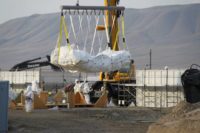KBR is denying an Aug. 20 report in the Times of London report that it has made an estimated $5-billion offer to acquire Jacobs Solutions Inc.'s government contracting business.
Jacobs had announced in May its plan to spin off the Critical Mission Solutions (CMS) unit, which is its primary services provider to the U.S. government and military, saying it expected to complete the separation in the second half of its 2024 fiscal year, which ends on Oct. 31, 2024. The unit, which made up 28.3% of Jacobs fiscal 2023 first quarter revenue, also serves clients in global automotive, aerospace, telecommunications and nuclear energy sectors, the parent said.
According to the Times, Houston-based KBR "approached Jacobs to signal its interest in buying the division," attributing the unit purchase value estimate to "city bankers." The publication said KBR and Jacobs both hold large contracts with the British government, gained through U.K.-based acquisitions "in the past decade."
In KBR's Aug. 21 statement, the science, technology and engineering giant said that while it normally “does not comment on market rumors ... this article has generated significant inbound questions.” While KBR and CMS offer professional services to some similar clients, particularly in the federal government, the former said acquiring the Jacobs unit "does not align with ... its capital deployment and strategic priorities and thus is not being pursued.”
A spokesperson for Jacobs declined comment on the rumored purchase, but told the Times it continues to "progress on activities associated with the intended separation.”
Jacobs CEO Bob Pragada also said, in announcing third-quarter results on Aug. 8, that the firm continued "to advance separation" of the CMS unit, noting to investors "positive interest from multiple outside parties.”
KBR reported that as of June 30, its Government Solutions business booked $11.82 billion of the total $21.06-billion company backlog, including award options. That total is up from $19.76 billion at the end of last year.
Quarter revenue for the government segment increased 3% over the same period last year. According to the company, the unit provides services that include electrical engineering, instrument systems and technology, exploration and mission support, mission engineering and systems analysis.
A joint venture of KBR and Intuitive Machines Inc. was awarded earlier this month a $719-million engineering services contract from NASA to support the agency's Applied Engineering and Technology Directorate at Goddard Space Flight Center in Maryland. The contract is for five years.
The award, won by KBR's Sustainable Technology Solutions segment, is for a cost-plus-fixed-fee indefinite-delivery, indefinite-quantity contract. That unit accounted for $5.06 billion of the firm's total backlog.
KBR "has been benefiting from high-end and differentiated government business work, strong margin performance, technology and consulting services," the company said in announcing the contract award.
Where Pragada Seeks Jacobs' Growth
Jacobs reported that about 31% of its overall fiscal 2022 revenue, around $4.6 billion, was from U.S. federal agencies, with CMS generating about 73% of those sales during that period. The segment also does work for international government customers. Its backlog was reported at $8.1 billion for its second quarter 2023, ending March 31.The unit employs about 16,000 of Jacobs' more than 60,000 employees.
According to Washington Technology, however, CEO Pragada told investors in its May second-quarter earnings call that the company seeks to have greater focus on its "critical infrastructure, sustainability and advanced portfolios."
Jacobs' officials said the separation strategy would provide the company and the CMS spinoff firm needed capital investment for each to more easily pursue growth and profits.
Jacobs said it will continue work for private clients. In government infrastructure, the company will provide consulting, planning, engineering, design program management and data solutions.
"We're constantly looking at our portfolio and doing an evaluation on how we're executing externally with our clients and the effect it's having advancing our strategy," Pragada said, in announcing the spinoff. "We feel confident in the decision that we made today."
Jacobs also said it will keep its unit that develops digital technologies and other services for government and infrastructure clients.
Despite the KBR rebuttal, one former government official familiar with federal contracting speculated that “the consolidation of government contractors is absolutely a concern" for the Biden administration.
The former official, who declined to be identified, said the trend could be seen "as a national security issue," both with economic resilience and cost. “Healthy competition is needed for a more resilient base and if the merger goes through, the government will take a hard look at it,” he added, noting that the U.S. Justice Dept. challenge last year to federal consultant Booz Allen Hamilton’s acquisition of EverWatch Corp. is evidence of the government’s aggressive approach to consolidation among federal contractors.






